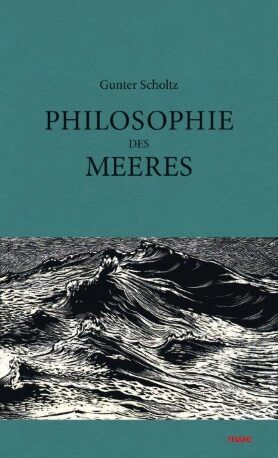Gunter Scholtz
Philosophie des Meeres
[Philosophy of the Ocean]
- mareverlag
- Hamburg 2016
- ISBN 978-3-86648-249-4
- 281 Pages
- Publisher’s contact details
Sample translations
The Oceanic Feeling
Biology and the theory of evolution weren’t alone in asserting that life began in the earth’s oceans. Philosophy did so much earlier. The natural philosophers of Ancient Greece – Thales of Milet, for instance, or Heraclitus – only knew material principals. "Thales did two great things at once," Gunter Scholtz writes in Ocean Philosophy. "He was the first to trace everything back to a single principal, and he defined it as water. Scholtz moves from the pre-Socratics via Humboldt, Hegel and Herder’s oceans as "warehouses of life" to ocean-influenced modern thinkers like Jaspers and Camus. Along the way, he makes an appeal for a contemporary environmental ethics that draws from the ancient enthusiasm for the teeming life of the oceans.
Scholtz, a professor of philosophy at the Ruhr University in Bochum, takes readers on "a cruise across the sea of philosophy." Instead of founding a "new specialist school of thought," he aims to investigate the question "of the relationship of philosophical thought to the sea." He succeeds splendidly. Scholtz never gets dragged into the wake of specialist jargon. He explains in language comprehensible to laymen why human beings, otherwise creatures of dry land, are so profoundly influenced by the foreign element of the sea. In seven chapters, his intellectual voyage provides an overview of the most important epochs and areas of philosophy, focusing attention not just on the sea but on those who see it.
Everything started with the Ancient Greek natural philosophers. Along with Thales and Anaximander, Scholtz elucidates Heraclitus’ dictum "all is flux." Heraclitus is the great philosopher of "permanent transformation, constant change." Both Nietzsche and Hegel were heavily influenced by Heraclitus and his philosophy of transformation. Every chapter draws connections and lines of influence throughout various epochs – in this sense the book does indeed "cruise" through the ocean of systems of thought in eminently understandable fashion. After the pre-Socratics, Ocean Philosophy moves on to discuss the other, equally traditional but considerably darker side of the sea. Plato, the philosopher of light, depicted the oceans as a place of clouded understanding, of the base world of the senses. Plato’s underworld, Scholtz writes, was "above all wet." It was a perspective that picked up on the deeply anchored image of the sea as a source of terror.
In the modern age – Scholtz uses Francis Bacon as an example of the new models of science and knowledge – the sea appears as an open horizon that needs to be researched and conquered. He continues on to ask whether and how people can take possession of the oceans. Over the course of the 18th and 19th centuries, there were heated quarrels about questions of maritime commerce and law. They were reflected in the works of Kant, Herder and Hegel, who all, in varying ways, "pleaded for the freedom of the sea."
Along with addressing such legal and ethical-philosophical questions, Scholtz also shows how the beginnings of a modern life philosophy can be derived from people’s relationship to the sea. The Romantic natural philosophers interpreted the sea as a source of life, and researchers like Lorenz Oken locate the origin of all organic material in primeval ocean slime. For Hegel too, writes Scholz, the ocean is a "gigantic space of procreation and birth." It’s an idea that can also be found in Humboldt’s Cosmos and Jules Michelet’s The Sea. The French historian not only praises the sea as the "wet nurse of living things" but also articulates his outrage at human cruelty to sea creatures and other animals, demanding rules for how non-human species are to be treated.
Proceeding from the redefined natural concepts of the 19th century, Scholtz traces the creation of modern criteria of ethical behavior, which culminates in a new bio-ethics and a new understanding of the sea. In the process, Ocean Philosophy delves into aesthetics (the sea as the symbol of the sublime) and modern self-discovery (the sea as a mirror of the soul). Scholtz moves from existentialist philosophers like Jaspers and Camus to the poet Baudelaire and back to Seneca and the Stoics. In 280 very readable pages, this book draws entertaining and enlightening connections between Antiquity and modernity, moral philosophy, modern psychological research and contemporary environmentalism. It makes you want to re-read the classics and go to the coast and look at the sea.
Translated by Jefferson Chase

By Jutta Person
Jutta Person, born 1971 in South Baden, studied German, Italian and Philosophy in Cologne and Italy, and gained a doctorate with a dissertation on the history of physiognomy in the 19th century. A journalist and cultural commentator, she is based in Berlin and writes for the Süddeutsche Zeitung, Die Zeit and Philosophie Magazin. From 2004 to 2007 she was an editor at Literaturen; since 2011 she has been in charge of the books section at Philosophie Magazin.
(Updated: 2020)
Publisher's Summary
"Life comes from the sea. Demonstrating how this also holds true for thought is the great merit of this clever book." Gert Scobel
For over two and a half thousand years, the sea has preoccupied philosophers: Even Thales, the first philosopher of Greek antiquity, regarded water as
the source of all existence; Kant believed that the oceans gradually would thwart the Earth’s rotation, which inevitably would destroy the world; Edmund Burke defined his concept of the sublime by likening it to viewing the sea, and Hegel, in turn, warned his students that the very act of philosophizing is like leaping into an endless ocean. The philosophy of the sea is not infinite; rather it is profound and unique: it allows us to think about the sea from the perspective of renowned thinkers and from a variety of philosophical disciplines, while also offering a perfect and easily understood introduction to philosophy in general - from antiquity to the modern age. That which makes us human always has been made tangible through our relationship to the sea.
(Text: mareverlag)
